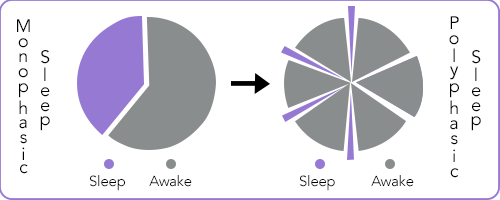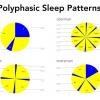Polyphasic Sleep

Polyphasic sleep is a pattern of sleep that includes many phases of rest and wakefulness throughout a 24-hour period. This pattern opposes monophasic sleep, the common pattern of sleep for adult humans, which is 7-9 uninterrupted hours of sleep at night.
There are different types of polyphasic sleep. Taking an afternoon siesta, for example, would fit the definition of polyphasic sleep. Some researchers also hypothesize that preindustrial people were segmented sleepers. They would wake up for 2-3 hours in the night between two 3-to-4-hour periods of sleep.
More recently, a community of people have adopted polyphasic sleep as a way to increase productivity, making it a form of biohacking. But rather than sleep for 7-9 hours total, proponents claim to survive on as little as 2 hours. They'll point to such innovators as Thomas Edision, Buckminster Fuller, and Winston Churchill, who all boasted short sleep schedules. Other names, like Leonardo da Vinci and Napoleon Bonaparte, appear frequently—but these claims are more difficult to confirm.
Adjustment to these strict polyphasic sleep schedules exhibits typical symptoms of sleep deprivation, including fatigue, nausea, cognitive impairment, and feelings of irritability or euphoria. Medical experts advise against this practice. But proponents claim that once people push through these symptoms, they'll reap the benefit of adding 10-11 more years to their waking life.
SleepPhones® Headphones for Polyphasic Sleepers
Our SleepPhones® headphones can be a valuable tool for those who are experimenting with polyphasic sleep. They offer a comfortable design that can promote good sleep even during shorter sleep cycles. This feature is particularly beneficial for polyphasic sleepers as it allows them to focus on their sleep without being disturbed by discomfort or outside noise.
For more in-depth information about polyphasic sleep, see the articles below:
-
What is Polyphasic Sleep, and is Eight Hours of Shuteye Really Necessary?

In this article, we examine the research behind polyphasic sleep, discuss its appeal and dangers, and make a case for midday naps.
-
Which is better Polyphasic, Biphasic, or Monophasic sleep?

Winter can be brutal, but it doesn't have to be miserable. Let SleepPhones® headphones do the work of relieving your seasonal distress. Here's how.
-
Is Polyphasic Sleep Healthy?
As you experiment with polyphasic sleep, a crucial question arises: what are the potential health implications of adopting unusual sleep patterns? Learn more about the benefits and drawbacks in our in-depth article.
